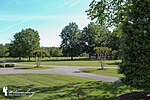Jamestown Academy (Virginia)
1964 establishments in Virginia1989 disestablishments in VirginiaDefunct schools in VirginiaSchools in James City County, VirginiaSegregation academies in Virginia ... and 1 more
Virginia school stubs
Jamestown Academy was a private school in James City County, Virginia, established in 1964 when the local public schools were ordered to desegregate following the landmark Brown v. Board of Education Supreme Court ruling.Tuition at Jamestown was covered in part by state tuition grants. Grants to a "nonprofit, nonsectarian private school", even segregation academies, were upheld by the Third Circuit Court of Appeals. On March 9, 1965, in Griffin v. State Board of Education, state tuition grants to white-only schools were found to be unconstitutional.The school closed in 1989.
Excerpt from the Wikipedia article Jamestown Academy (Virginia) (License: CC BY-SA 3.0, Authors).Jamestown Academy (Virginia)
Waltz Farm Drive, Williamsburg
Geographical coordinates (GPS) Address Nearby Places Show on map
Geographical coordinates (GPS)
| Latitude | Longitude |
|---|---|
| N 37.306149 ° | E -76.73587299 ° |
Address
Living Proof Bapt Ch
Waltz Farm Drive 309
23185 Williamsburg
Virginia, United States
Open on Google Maps





